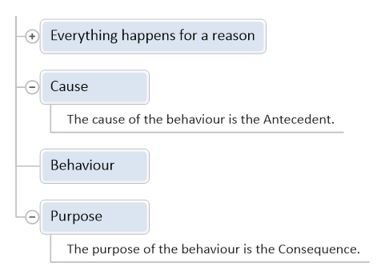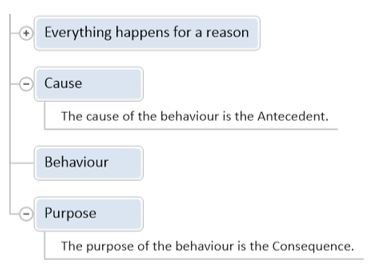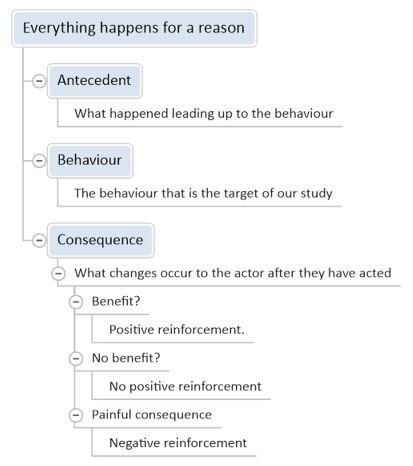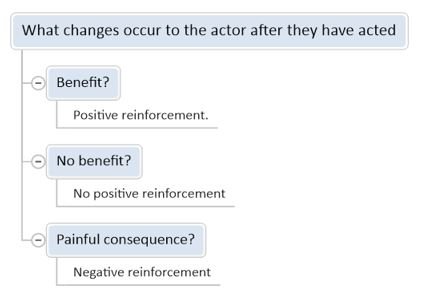How to Change Behaviour
Behaviour Modification
Whenever you wonder why a colleague (or a child) does something, which to you seems inexplicable, you should ask yourself these three questions:
- What were the conditions that preceded and triggered the behaviour?
- Did the person behaving, gain any form of benefit as a result of his/her behaviour?
- If he/she did gain a benefit, what was it?
Let us investigate the interesting world of "behaviour modification".
What is the definition of behaviour modification?
Behaviour modification is a system of planned interventions, which are designed to interrupt a current "problematic behaviour" and cause it to change to a more "desirable behaviour" (ie the target behaviour).
Behaviour modification is based upon a three-part sequence called A.B.C:
- Antecedent: Refers to the conditions that preceded the behaviour. The antecedent asks the question, "What was going-on in the environment prior to the behaviour?"
- Behaviour: Refers to the specific action, that the person did or said. The behaviour asks the question, "What exactly did this person actually do?" or "When placed in a certain set of conditions, how do people behave?"
- Consequence: Refers to the new conditions that immediately follow the behaviour. The consequent asks, "What changes occurred in the conditions, as a consequence of the behaviour? and, "How did those changes affect the person behaving? The most interesting question is: after the behaviour, did the person behaving gain anything?

Let us make an underlying assumption explicit: the assumption is "Everything happens for a reason."
But there are two types of reasons: causes, and purposes, and it is important to understand that:
- The cause of the behaviour is the Antecedent.
- The purpose of the behaviour is the Consequence.

Here is a fact of human nature: Everyone wants the current situation to give them what they want.
Therefore if, in any set of circumstances, a person performs an action (a behaviour), that results in them gaining an immediate benefit, then that behaviour is more likely to occur. (The benefit must be regarded from the behaver's personal perspective, not your benefit, nor "for the Good of the Many").
So, when you are wondering why a person behaves in a way which, to you, seems inexplicable, you might ask those three questions:
- What were the conditions that triggered the behaviour?
- What happened to the person behaving after the behaviour; did they gain a benefit, (measured from the perspective of the person behaving)?
- If they did gain a benefit, what was it?
Example one:
Imagine an 8-year-old child who always misbehaves whenever he is in the supermarket, food shopping with his parent. The child constantly cries, pulls, shouts, and stamps his feet. The parent, in an attempt to mollify the child, buys him a bar of chocolate.
When asked why he gave the child chocolate, the parent said, "Because I needed to calm him down and to shut him up".
Ultimately, what do you think the parent is training the child to do and to believe?
The parent is accidentally training the child to misbehave, because the chocolate POSITIVELY reinforces the child's BAD behaviour.
Positive reinforcement.
If you were wise, you would never positively reinforce a negative behaviour.
In addition, the parent is inadvertently training the child to believe that "bad behaviour pays dividends".
Here are two principles to note:
- Never positively reinforce a negative behaviour
- Only positively reinforce good behaviours
Example two: If a person at work speaks harshly and swears at his manager and, as a result, the manager relents and gives the aggressor what he wants, just to shut him up and get rid of the problem behaviour, then ultimately, what is the manager training the person to do?
Here is the key principle to understanding behaviour modification:
It is the Perceived Consequences of a behaviour that determine whether it will be repeated. (The consequences must be viewed from the perspective of the person behaving, not from the perspective of onlookers, or considerations of what constitutes The General Good).
In relation to consequences there are three types:
- Beneficial consequences.
- No consequences.
- Detrimental consequences.
Here is a new diagram of the extended concept:

If a person behaves in a particular way, and does so repeatedly, then we can assume they perceive that the behaviour is producing some kind of beneficial consequence. (From their perspective, not yours, nor anyone else's).
As long as the person continues to receive a perceived benefit for behaving in a certain way, that behaviour will continue.
Similarly, if a person is failing to do something that you want them to do, then it is because the person perceives either:
- No benefit for doing it, or
- They think the behaviour will lead to a dis-benefit, or painful consequence.
To repeat, the detrimental consequence must be considered from the perspective of the person behaving, not you, nor the greater good.
If you want to modify a behaviour, then the first thing to do is to analyse the immediate consequences, that happen to the person behaving.
- If your analysis shows the person behaving is receiving an immediate benefit, of any kind, then that behaviour is likely to reoccur.
- If you want to change that behaviour, then you must remove its beneficial consequences.
- If your analysis shows the person is not receiving any dis-benefit for a bad behaviour, then you should ensure that either no benefit should follow a bad behaviour, ie No positive reinforcement.
- Or "painful consequences" should always follow a bad behaviour. Negative reinforcement.
If you change the consequences, then you will change the behaviour.

If you have a bad habit, such as eating too much (or eating too little), then ask yourself the following questions?
- What immediate benefits does your subconscious mind believe you are gaining from engaging in this "unwanted behaviour"?
- How can you arrange things in your head so that the unwanted behaviour is associated to either: no benefit or painful consequences?
- How can arrange things in your head so that you begin to attach more benefits to an alternative corrective behaviour?

Definition: behaviour modification
Behaviour modification is a people management process that tracks the cue before an act, the act itself, and the result after it. By removing the gain or adding a cost to bad acts, and by giving clear reward to good ones, it stops old habits and builds new, better habits.
Show CG4D Definition
- uses planned steps to study and change actions
- follows the Antecedent-Behaviour-Consequence model
- cuts the gain from bad acts
- gives quick reward to the target act
Article Summary
Behaviour modification is clear: spot the trigger, name the act, and set the result. When bad behaviour no longer brings a gain, or brings a cost, it fades. When good behaviour earns quick praise or other clear benefit, it grows. Change the result and you change the behaviour-in children, co-workers, and yourself.
Frequently Asked Questions
Here are some questions that frequently get asked about this topic during our training sessions.
What is the ABC model in behaviour modification?
How does positive reinforcement affect bad behaviour?
Why might a child repeat supermarket tantrums?
What is a manager really teaching when giving in to swearing staff?
How do perceived consequences shape habits?
How can I remove a benefit that fuels my bad habit?
Should every unwanted behaviour face punishment?
Thought of something that's not been answered?
Did You Know: Key Statistics
The 2024 CIPD Good Work Index shows 57% of UK workers say bad behaviour from co-workers is now their main cause of stress at work. A 2023 study in the Journal of Child Psychology & Psychiatry found that steady positive praise cut bad classroom behaviour by 45% within eight weeks.Blogs by Email
Do you want to receive an email whenever we post a new blog? The blogs contain article 5-10 minutes long - ideal for reading during your coffee break!
Further Reading in People Management
-
Improve your people management skills
Learn six people management skills: listening, questioning, conflict control, trust and positivity to build a thriving team. Start soft skills training today.
Read Article > -
Talent Management in the Post-Covid World
Learn post-Covid talent management tips: spot self-motivated workers, train remote teams and boost home working performance with goals and self-discipline.
Read Article > -
How to Separate Reasons From Excuses
Learn how to spot reasons vs excuses, set fair manager policy and boost workplace accountability. Use clear tests to act fast, stay fair and lift team output.
Read Article > -
The AID Feedback Model
Learn the AID feedback model: Action, Impact, Do differently. Give clear, objective feedback that drives behaviour change, engagement and better results at work
Read Article > -
Better People Management Skills
Learn six practical steps to sharpen your people management skills: set goals, communicate, plan, resolve conflict, stay in control and inspire your team to suc
Read Article >
Looking for People Management Skills Training?
If you're looking to develop your People Management Skills, you may find this People Management Skills Training Course beneficial:
Open Training Course Pricing and Availability
Next Open Course Starts in 8 days, Manchester City, places available






